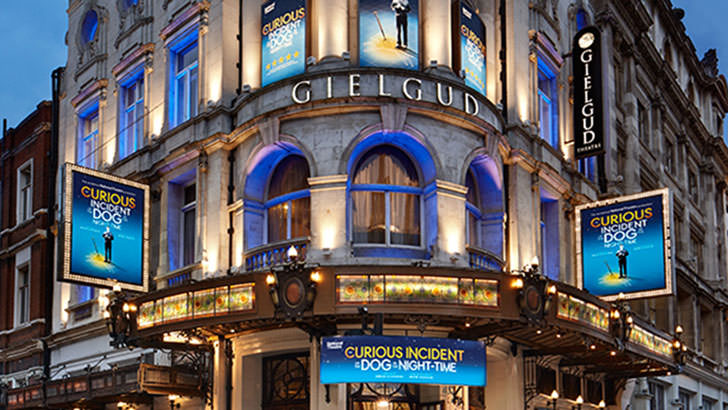GIELGUD THEATRE HISTORY
PRODUCTION HIGHLIGHTS
1906 Opened as the Hicks Theatre on 27 December with The Beauty of Bath, a musical play by Seymour Hicks (after whom the theatre was named) and Cosmo Hamilton.
1907 Brewster’s Millions, a comedy about a man trying to spend a fortune in 30 days in order to gain an inheritance, was the theatre’s first big success, starring Gerald du Maurier.
1909 The American impresario Charles Frohman became sole manager of the theatre and changed its name to the Globe. It reopened with His Borrowed Plumes written by Winston Churchill’s mother, Lady Randolph Churchill.
1913 The Clock Goes Round challenged theatrical superstition when it opened on Friday 13th with 13 characters. Needless to say it closed after 13 performances.
1921 Before A A Milne became best known for Winnie-the-Pooh he was a popular playwright. Three of his plays were presented at the Globe in the 1920s – The Truth About Blayds (1921), Mr Pym Passes By (1922) and Belinda (1922).
1923 Somerset Maugham’s satirical comedy Our Betters was the theatre’s most popular play during the 1920s with 548 performances.
1928 John Gielgud made the first of 15 appearances at the theatre in a short-lived farce entitled Holding Out the Apple.
1937 H M Tennent presented their first production, of G B Shaw’s Candida, at the theatre that subsequently became the company’s headquarters until 1991.
939 Edith Evans received outstanding reviews for the ‘handbag’ role with which she is synonymous – Lady Bracknell in The Importance of Being Earnest, directed by John Gielgud.
1943 While the Sun Shines, a wartime comedy romance by Terence Rattigan, ran for 1,154 performances, boosting morale throughout 1944 and 1945.
1949 Among the cast of Christopher Fry’s poetic drama The Lady’s Not for Burning were two future stars of stage and screen – Richard Burton and Claire Bloom.
1954 Bridget Boland’s tough psychological drama The Prisoner opened on 14 April with Alec Guinness as the imprisoned clergyman. The following year the play’s producer, Peter Glenville, made a film of the play that remains one of the best in Guinness’s career. Beatrice Lillie brought her show An Evening with Beatrice Lillie across from Broadway where it had started as a 14-day experiment and became a £265,000 sell-out.
1956 Nude with Violin, a comedy written by Noël Coward and directed by him and John Gielgud, enjoyed successful runs at the Gielgud, on Broadway and in Australia. The painting used in the play when it first opened in Dublin caused such a sensation that it had to be replaced for the London run.
1960 Robert Bolt scored a double triumph with his play A Man for All Seasons starring Paul Scofield as Thomas More, showing at the Gielgud, and another play he had written, The Tiger and the Horse, starring Michael Redgrave and his daughter, Vanessa, playing next door at the Queen’s.
1966 There’s a Girl in My Soup became the theatre’s longest-running production, opening on 15 June and transferring to the Comedy Theatre more than three years later. Donald Sinden played the TV host with a wandering eye.
1974 The first of a number of Alan Ayckbourn plays to be premiered at the theatre opened on 1 August. The Norman Conquests starred Tom Courtenay, Michael Gambon, Penelope Keith and Felicity Kendal and won the Evening Standard Award for Best Play.
1976 Michael Frayn’s riotous comedy Donkeys’ Years about a drunken college reunion where the curate turns his frock into a nun’s habit and impersonates Salome won the Olivier Award for Best Comedy.
1983 Denise Deegan’s send up of life in a girls’ boarding school, Daisy Pulls It Off, entertained audiences for over 1,000 performances.
1987 In Peter Shaffer’s comedy Lettice and Lovage, Maggie Smith played Lettice Douffet, a role especially written for her, and Margaret Tyzack was Lotte Schoen. The play transferred to Broadway where it won them both Tony Awards.
1994 The theatre was renamed the Gielgud as a special tribute to Sir John and to distinguish it from the newly opened Shakespeare’s Globe on the South Bank. The opening production under its new name was Peter Hall’s Hamlet with Stephen Dillane.
2000 The Graduate was a big box office draw, in part because of the succession of leading ladies including Kathleen Turner, Jerry Hall and Dallas star Linda Gray who appeared naked on stage.
2004 Judi Dench appeared with the Royal Shakespeare Company for the first time in over ten years, giving a performance of the Countess in All’s Well That Ends Well, described as a ‘masterclass in classical acting’.
2006 Delfont Mackintosh Theatres took over operational control of the Gielgud from Really Useful Theatres and presented a series of acclaimed productions including The Crucible with Iain Glen, Frost/Nixon with Frank Langella and Michael Sheen, Equus with Daniel Radcliffe and Richard Griffiths, Macbeth with Patrick Stewart, The Audience with Helen Mirren and Blithe Spirit with Angela Lansbury.
2014 The highly inventive, multi-award winning National Theatre production of The Curious Incident of the Dog in the Night-Time captivated audiences for almost three years.
2017 Jez Butterworth’s gripping, hard-hitting play The Ferryman set during the Irish troubles in 1981 was compelling viewing and featured both animals and a family of all ages from a tiny baby to the elderly Aunt Maggie Faraway.
2018 An updated version of Sondheim’s Company made the central character female and added a gay marriage to the storyline, an adaptation which worked perfectly and gave the musical new contemporary appeal.
2019 Upstart Crow, Ben Elton’s brilliant comedy in which David Mitchell made his stage debut as William Shakespeare, was brought to a premature close by the coronavirus pandemic.
2019 The concert production of Les Miserables first opened temporarily at the Gielgud Theatre in summer 2019, running from 10th August 2019 while the Queen’s Theatre, now renamed the Sondheim Theatre was being refurbished.
2022 The highly anticipated play To Kill A Mockingbird made its West End debut here in March 2022, based on Harper Lee’s Pulitzer Prize-winning novel, and directed by Bartlett Sher.





